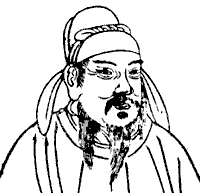 W
WAn Lushan or An Lu-shan was a general in the Tang dynasty and is primarily known for instigating the An Lushan Rebellion.
 W
WEmperor Daizong of Tang – 10 June 779), personal name Li Yu, né Li Chu, was an emperor of the Chinese Tang Dynasty.
 W
WEmperor Dezong of Tang, personal name Li Kuo, was an emperor of the Chinese Tang Dynasty and the oldest son of Emperor Daizong. His reign of 26 years was the third longest in the Tang dynasty. Emperor Dezong started out as a diligent and frugal emperor and he tried to reform the governmental finances by introducing new tax laws. His attempts to destroy the powerful regional warlords and the subsequent mismanagement of those campaigns, however, resulted in a number of rebellions that nearly destroyed him and the Tang Dynasty. After those events, he dealt cautiously with the regional governors, causing warlordism to become unchecked, and his trust of eunuchs caused the eunuchs' power to rise greatly. He was also known for his paranoia about officials' wielding power, and late in his reign, he did not grant much authority to his chancellors.
 W
WEmperor Ruizong of Tang, personal name Li Dan, also known at times during his life as Li Xulun, Li Lun, Wu Lun, and Wu Dan, was the fifth and ninth emperor of Tang Dynasty. He was the eighth son of Emperor Gaozong and the fourth son of Emperor Gaozong's second wife Empress Wu. He was wholly a figurehead during his first reign when he was controlled by his mother, and he was the titular and puppet ruler of the Tang Empire from 684 to 690. During his second reign after his mother's death, significant power was exercised by his sister Princess Taiping.
 W
WEmperor Suzong of Tang, personal name Li Heng, né Li Sisheng (李嗣升), known as Li Jun (李浚) from 725 to 736, known as Li Yu (李璵) from 736 to 738, known briefly as Li Shao (李紹) in 738, was an emperor of the Tang dynasty and the son of Emperor Xuanzong. Suzong ascended the throne after his father fled to Sichuan during the An Lushan Rebellion in 756; Li Heng himself had fled in the opposite direction, to Lingwu, where he was declared emperor by the army. Much of Emperor Suzong's reign was spent in quelling the aforementioned rebellion, which was ultimately put down in 763 during the reign of his son Emperor Daizong.
 W
WWu Zhao, commonly known as Wu Zetian, alternatively Wu Hou, and during the later Tang dynasty as Tian Hou, was the de facto ruler of China, first through her husband the Emperor Gaozong and then through her sons the Emperors Zhongzong and Ruizong, from 665 to 690. She subsequently became empress regnant of the Zhou dynasty (周) of China, ruling from 690 to 705. She is notable for being the only female monarch in the history of China.
 W
WEmperor Xuanzong of Tang, also commonly known as Emperor Ming of Tang or Illustrious August, personal name Li Longji, was the seventh emperor of the Tang dynasty in China, reigning from 713 to 756 CE. His reign of 43 years was the longest during the Tang dynasty. In the early half of his reign he was a diligent and astute ruler. Ably assisted by capable chancellors like Yao Chong, Song Jing and Zhang Yue, he was credited with bringing Tang China to a pinnacle of culture and power. Emperor Xuanzong, however, was blamed for over-trusting Li Linfu, Yang Guozhong and An Lushan during his late reign, with Tang's golden age ending in the An Lushan Rebellion.
 W
WEmperor Zhongzong of Tang, personal name Li Xian, and at other times Li Zhe or Wu Xian, was the fourth Emperor of the Tang dynasty of China, ruling briefly in 684 and again from 705 to 710. During the first period, he did not rule, and the entire government was in the hands of his mother, Empress Wu Zetian and was effectively overthrown by her imperial power after opposing his mother. In the second reign period, most of the government was in the hands of his beloved wife Empress Wei.